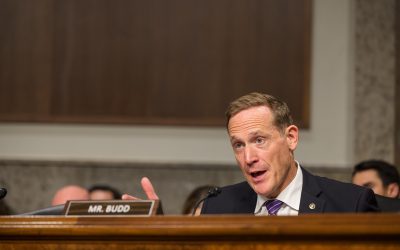Washington, D.C. — Today, Senators Ted Budd (R-NC) and Rep. Diana Harshbarger (R-TN) led a coalition letter to the Bureau of Alcohol, Tobacco, Firearms and Explosives (ATF) and the Department of Justice (DOJ) demanding answers from the Biden administration about its “zero tolerance” policy for federal firearms licenses (FFLs).
This letter is a follow up to the Budd/Harshbarger letter that was sent in June 2022. The Biden Administration has refused to provide any of the information that letter requested in the eight months since it was sent.
Senate signers include Sens. Thom Tillis (R-NC), Bill Hagerty (R-TN), John Kennedy (R-LA), Roger Marshall (R-KS), Mike Lee (R-UT), Ted Cruz (R-TX), Cynthia Lummis (R-WY), James Lankford (R-OK), Steve Daines (R-MT), Mike Braun (R-IN), and Eric Schmitt (R-MO).
We write to express our deep disappointment that you have failed to respond to the congressional inquiry sent on June 27, 2022. Congress is unable to appropriately perform its Constitutional power to conduct oversight of the Executive Branch with this level of delay.
As the Biden-Harris Administration is undoubtedly aware, the Second Amendment to the United States Constitution unequivocally states, “the right of the people to keep and bear arms, shall not be infringed.” Yet, at every turn, this Administration appears to be weaponizing its executive powers to infringe upon this constitutionally protected right.
Under 18 U.S.C. § 923, Congress explicitly requires that the Attorney General “shall” approve any application submitted for a license to sell firearms provided certain criteria are met. Among other criteria, an applicant must not have “willfully violated” the law, must not have “willfully failed to disclose any material information required[,]” and did not make “any false statement as to any material fact, in connection with his application.” Under the plain language of the statute, once an applicant satisfies the statutory criteria, the Attorney General must approve the application within 60 days. This statute is not discretionary.
Under a different subsection, that same statute, 18 U.S.C. § 923(e), states that only after notice and an opportunity for a hearing, may the Attorney General revoke a Federal Firearms License (FFL) only if, among other reasons, the holder of such license has “willfully violated” applicable law.
On June 22, 2021, the Biden-Harris Administration issued a “Fact Sheet” entitled, “Biden-Harris Administration Announces Comprehensive Strategy to Prevent and Respond to Gun Crime and Ensure Public Safety,” announcing a new policy to revoke firearm licenses.6 Under this “Fact Sheet,” the Bureau of Alcohol, Tobacco, Firearms, and Explosives (ATF) is empowered to revoke a dealer’s FFL the first time they violate federal law by “willfully” engaging in certain behavior, including “falsifying records, such as a firearms transaction form[.]”
Yet, it has recently come to our attention that in the “11 months since Joe Biden declared war on ‘rogue gun dealers,’ the ATF has revoked 273 Federal Firearms Licenses (FFLs)—an increase of more than 500%.” What is more disturbing is that “rather than targeting the true rogues, Biden’s ATF is revoking FFLs for the most minor of paperwork errors, which were never a concern for the ATF until Biden weaponized the agency.”
That leads to an important question: how does this Administration, and its executive branch agencies, define the term “willful”? Furthermore, to what extent is this Administration willing to interpret the term “willful” to capture conduct that falls far below the well-defined threshold in law? Based on the statute’s wording, such minor typographical errors do not constitute grounds to revoke a FFL.
In using the word “willful,” Congress clearly intended to exclude minor typographical errors as a basis to revoke a dealer’s FFL. Black’s Law Dictionary defines the term “willful” as follows: “Voluntary and intentional, but not necessarily malicious. A voluntary act becomes willful, in law, only when it involves conscious wrong or evil purpose on the part of the actor, or at least inexcusable carelessness, whether the act is right or wrong.”
Further, “[t]he word ‘willful’ or ‘willfully’ when used in the definition of a crime, it has been said time and again, means only intentionally or purposely as distinguished from accidentally or negligently.” Courts have specifically applied this definition to 18 U.S.C. § 923: “[A] firearms dealer is considered to have acted willfully under § 923 if, with knowledge of what the regulations require, the dealer repeatedly violates those regulations.” The same standard is used in courts across the country. But under this Administration’s policy, it is clear that this Administration wanted to deem a mere negligent act to be willful such that a dealer’s FFL would be denied, or worse, that a license would be revoked, resulting in the loss of American jobs and small family-owned businesses.
The Biden-Harris Administration claims this policy will increase public safety and reduce crime. But revoking a FFL over a minor paperwork issue turns a teachable moment into the end of a dealer’s livelihood. This new policy runs counter to the close working relationship firearm dealers have had with ATF for decades. For example, the firearm industry’s trade association, National Shooting Sports Foundation (NSSF), matches the rewards ATF offers for information related to gun store robberies. NSSF and ATF have also worked together on Operation Secure Store, a program that provides FFLs with resources on how to better secure their physical storefronts. This collaboration makes FFLs comfortable reporting to ATF suspicious activity that may not rise to the level of a criminal offense. The new “Zero Tolerance Policy” threatens this longstanding partnership. Firearm dealers need to be comfortable sharing information with ATF without worrying about their FFL being revoked.
Under the new “Zero Tolerance Policy” FFLs have little incentive to voluntarily report crimes, especially if doing so threatens their license. As an example, consider a FFL that discovers one of its employees is participating in straw purchases or other unlawful transactions. With a collaborative relationship between FFLs and the ATF, the FFL has an incentive to notify authorities and work with ATF to prosecute this crime. This arrangement promotes enforcement of the laws and the ATF’s mission. But the “Zero Tolerance Policy” appears to impute on the employer liability for a low-level employee’s actions, even though the employee’s acts are illegal and thus outside the scope of employment. Because the Gun Control Act only imposes an affirmative duty to report the theft or loss of a firearm, the best course of action for a FFL may be to withhold the information and refuse to cooperate with an investigation.
We have also heard from FFLs that ATF has sidelined local Directors of Industry Operations (DIO) and centralized decisions on FFL revocations at ATF headquarters. As you are aware, each of ATF’s 25 field divisions has a DIO who is authorized to revoke a license after holding a hearing. In a 2014 fact sheet, ATF explained “[t]he authority to revoke [a license] rests with ATF’s Directors of Industry Operations” who normally make the final determination unless “the matter is highly complex or sensitive, or if the licensee’s operations and alleged violations are taking place in several field divisions.” It is troubling that ATF is discounting the judgment of its local factfinders in favor of bureaucrats in Washington, D.C. This move further separates local career staff from the final decision and degrades the crucial working relationship between industry and their regulator.
The Executive Branch has a duty to “take Care that the Laws be faithfully executed” based on the original meaning of the statute Congress enacts. The Biden-Harris Administration, however, believes its role is to re-write the laws written by Congress to further its radical anti- Constitutional agenda without consequence.
We respectfully request that the Administration immediately cease the misinterpretation of the word “willful” and resume with an interpretation that corresponds with the meaning of the word and the intent of Congress.
By March 1, 2023, please provide the following information:
- The legal basis used to justify your interpretation of the word “willful” after the release of the June 23, 2021, “Fact Sheet”.
- Any Department of Justice (DOJ) policy, guidance, fact sheet, or other similar document produced since June 23, 2021 to implement the “Zero Tolerance Policy” described in the “Fact Sheet”.
- Any internal correspondence related to the release of a potential June 23, 2021 “Zero Tolerance Policy” to or from any political appointee at the DOJ, ATF, and/or the White House (including but not limited to the White House Counsel’s Office and the White House Domestic Policy Council).
- Any internal correspondence related to the policies announced in the June 23, 2021White House Memo to or from any political appointee at the DOJ, ATF, and/or the White House (including but not limited to the White House Counsel’s Office and the White House Domestic Policy Council).
- Any internal correspondence related to the interpretation of the word “willful” to or from any political appointee at the DOJ, ATF, and/or the White House (including but not limited to the White House Counsel’s Office and the White House Domestic Policy Council).
- The number of prosecutions under the Gun Control Act aided by tips or other information voluntarily provided by FFLs. Please provide information for the current year and the past five fiscal years, and for fiscal year 2021, include the number of prosecutions aided by such tips initiated after June 23, 2021.
- The number of FFL revocation actions initiated since June 23, 2021. Of these, separately provide the number of cases involving a licensee who previously received a warning letter, notification that their inspection was closed, and without receiving any new information had their licensed revoked due to the same issue for which the warning letter was issued.
- For each FFL revocation action initiated since June 23, 2021, identify the basis for each revocation without including Personal Identifiable Information of the licensee.
- The number of revocation proceedings in which the DIO’s initial decision was not the final outcome. Please provide information for the current year and the past five fiscal years, and for fiscal year 2021, separate data from before and after June 23, 2021.
- Any internal correspondence related to the June 27, 2022 letter to or from any political appointee at the DOJ, ATF, and/or the White House (including but not limited to the White House Counsel’s Office and the White House Domestic Policy Council).
We look forward to your timely consideration and response.
###



